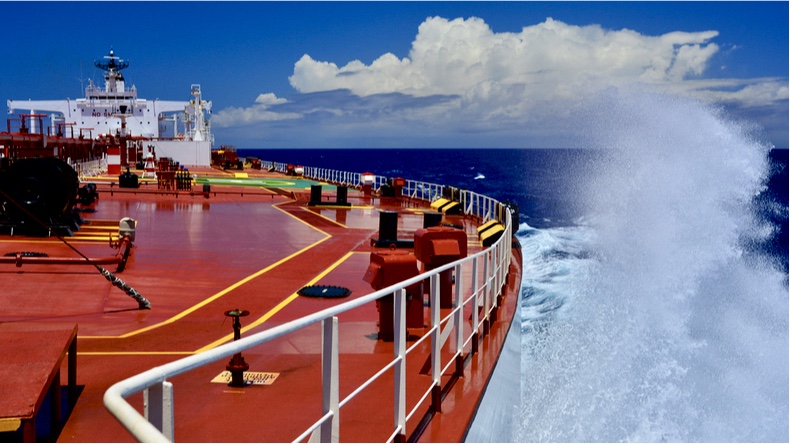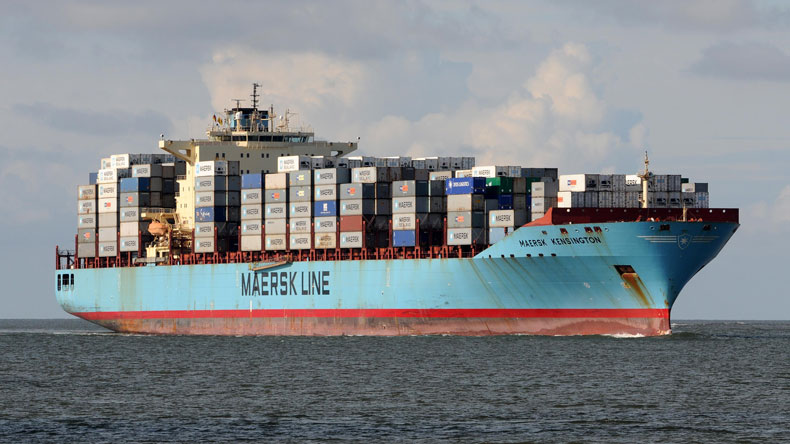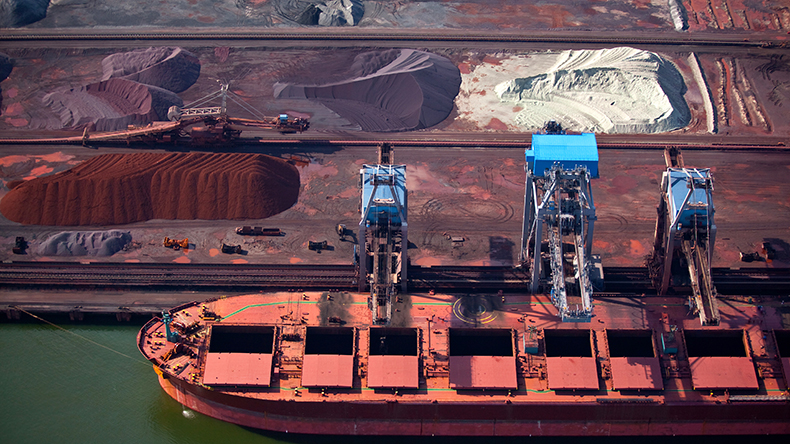Weekly briefing: Steep fall in tanker tonne-mile demand; Maersk reinstates full-year guidance
Wakashio disaster takes new turn after arrest of ship’s master and chief officer
An 18.6% drop in tanker tonne-mile demand was recorded in July, with the steepest falls recorded in the Middle East and West Africa, while the world’s biggest box carrier expects its earnings this year will exceed previous expectations, and there are question marks over the legal ramifications of the Wakashio grounding and oil spill
THIS weekly briefing provides sector-by-sector coverage of the biggest news and analysis in shipping.
Follow the links within the text to the relevant news items in each market segment.
Tankers
Tanker tonne-mile demand dropped 18.6% in July compared with the same month last year, according to the latest Lloyd’s List Intelligence data, with preliminary August data suggesting falls of the same magnitude this month.
Tonne-mile demand, which measures volumes carried by distance travelled, is seen as a proxy for demand for crude tankers. The drop came despite many oil producers reversing voluntary or agreed supply cuts in July.
The cratering tonne-mile demand suggests that this is the main driving factor underpinning the flat-lining tanker rates seen so far in August, rather than the floating storage currently unwinding across Asia.
The steepest falls were recorded from the Middle East and West Africa, which rely on mostly on very large crude carriers and suezmaxes to export crude to destinations primarily in Asia, Europe and the US.
Concordia Maritime, a Swedish product tanker owner, expects subdued demand for oil-product transportation for the rest of the year, although the market should be “back on track” in 2021, it says.
A combination of reduced oil production, stock withdrawals and reduced refinery volumes would result in lower freight rates than in the first half of the year, said chief executive Kim Ullman.
However, a “gradual easing of restrictions, restarting of economies, massive support programmes and normalised stock levels will contribute to a faster return to the ‘pre-corona’ situation than many people first thought — and this applies both to oil consumption and demand for tanker transport,” he said.
Meanwhile, St Kitts and Nevis has deflagged four sanctions-busting tankers involved in smuggling Iranian oil that were using a new, game-changing deceptive shipping practice to avoid detection.
The 2002-built, very large crude carrier Geissel (IMO 9246279) was deflagged on August 4 following press reports it had visited an Iranian port, the registry confirmed in a statement.
The 2003-built, VLCC Amfitriti (IMO 9273337); 2000-built, VLCC Lerax (IMO 9181194) and the 2002-built, Ekaterina (IMO 290078)] were also removed at the same time for the same reason (subscribers to Lloyd’s List Intelligence Seasearcher can track the vessels using the links above).
The tankers were among 16 vessels deploying a newly identified tactic that manipulates Automatic Identification Systems data so that it shows the vessel in one place when it is actually in another location.
AIS vessel-tracking is the cornerstone of US Treasury, state department and coastguard guidance for international shipping released in May to identify illicit shipping practices for evading sanctions on Iran and North Korea.
The US has also made its ‘largest-ever seizure’ of Iranian gasoline cargoes from four Greek-owned tankers last week, according to the Justice Department.
The US “successfully executed” a federal warrant issued on July 2 for the arrest and forfeiture of the cargoes that were being carried by the tankers — Bella (IMO 9208124), Bering (IMO 9149225), Pandi (IMO 9105073) and Luna (IMO 9208100).
Containers
Maersk, the world’s largest ocean box carrier, has said it expects to post an operating result even higher than previously anticipated for 2020, as volumes “progressively recover” in the third quarter of 2020.
Upon the release of its second quarter of the year results, the container shipping giant has reinstated its guidance, suspended in March because of the coronavirus pandemic, and expects earnings before interest, tax, depreciation and amortisation to be between $6bn–$7bn. This is before restructuring and integration costs are taken into account.
China International Marine Containers says its second-largest shareholder Cosco Shipping wants to sell its stake in the company, raising prospects of an ownership restructuring of the container manufacturer and offshore rig builder.
Two other shareholders, Broad Ride and Promotor Holdings, had also made the same proposal, according to an exchange filing.
The sale could potentially lead to a change of its largest shareholder, said Shenzhen and Hong Kong-listed CIMC, adding the deals are not yet certain and still pending regulatory approvals.
Meanwhile, Cosco and Maersk are among six countries that have been asked by China’s transport ministry to explain a recent steep rise in rates on the Sino-US trade.
Beijing’s intervention comes amid discontent expressed by some domestic exporters, who have benefited from a strong recovery in US demand but want to know why they have sustained a sharp rise in their shipping costs since the second half of the year.
However, carriers and analysts argue that the markup is mainly driven by a rally in US demand and the current ship capacity is more than that on offer a year ago.
The world containership fleet’s steepening growth curve over the past 10 years or so appears to be flattening out.
The orderbook, which surged in the years following the global financial crisis, has fallen back to less than 10% of the existing fleet, according to some estimates.
Total deliveries this year were expected to reach 660,000 teu, down 38% from 1.1m teu in 2019.
Data from Lloyd’s List Intelligence showed 66,315 teu of capacity delivered during July, but this was dominated by two of HMM’s series of 23,000 teu vessels, HMM Helsinki and HMM Hamburg.
Other the Costamare’s 11,000 teu YM Triumph, built for charter to Yang Ming, the remainder of the deliveries were sub-3,000 teu vessels.
The Port of New York–New Jersey has overtaken California’s Port of Long Beach as the number two container facility in the United States, according to an economic impact report released by the New York Shipping Association.
The NJTPA report said the region’s maritime facilities handled nearly 7.5m teu, up from 6.3m teu in 2016 and 5.8m in 2012. They also handled 578,000 vehicles, as well as 50m tons of cargo and nearly 102,000 tons of breakbulk cargo.
The port of Los Angeles remains the country’s number one facility with throughput of 9.3m teu in 2019, but PNYNJ may see an argument regarding the number two spot as Long Beach recorded more than 7.6m teu in 2019.
Finally, container shipping has taken to scrubbers more than any other sector, despite the increasing payback time for the exhaust gas cleaning technology.
Figures from Lloyd’s List Intelligence show 651 live vessels with a combined capacity of more than 5.2m teu have scrubbers fitted. In comparison with crude oil tankers, Lloyd’s List Intelligence reports 518 live vessels with a combined tonnage of 116.2m dwt.
Dry bulk
The grounded capesize off Mauritius has dominated dry bulk headlines this week, as the 203,130 dwt ship broke apart over the weekend.
The Mauritius police has subsequently arrested the captain and chief officer for endangering safe navigation.
In light of the crew change crisis, two of the vessel’s crew members were said to have been on board the vessel for more than a year.
Official investigations to determine the cause of the incident could take months to complete after local media reports suggested the crew veered the ship too close to the coral reef to obtain wifi signal as one member celebrated his birthday.
Panama, the flag state responsible for carrying out the casualty investigation, was sending a team over to Mauritius, and vowed its full co-operation. It said in a statement that preliminary findings, the vessel deviated off-course due to adverse weather conditions.
In the meantime, costs of the oil spill clean-up could be capped at $18m under the Bunker Convention, lawyers said.
In other news, the UN World Food Programme said it was sending grains to Beirut after the blast in early August which knocked out a grain silo. A shipment of 17,500 tonnes of wheat flour had already been dispatched from the region, which is due to arrive on August 20. It has pledged to ship 130,000 tonnes of wheat flour/grains to stabilise the country’s supplies.
In company news, Norway’s Golden Ocean said it was increasing its charter coverage due to market uncertainty. The company posted a net loss of $41.3m in the second quarter of the year compared with a loss of $33.1m over the same period a year earlier.
Australian miner BHP meanwhile warned of slowing growth outside China as major economies continue to battle with the coronavirus pandemic. While a rebound is expected in 2021, the growth is smaller than previously anticipated.
And finally, Lloyd’s List conducted an analysis to find out whether the strong growth in China’s imports in the first half of the year would be repeated in the remainder of 2020.





